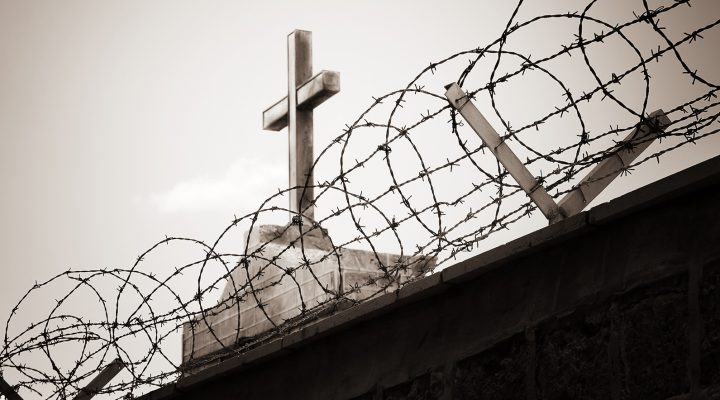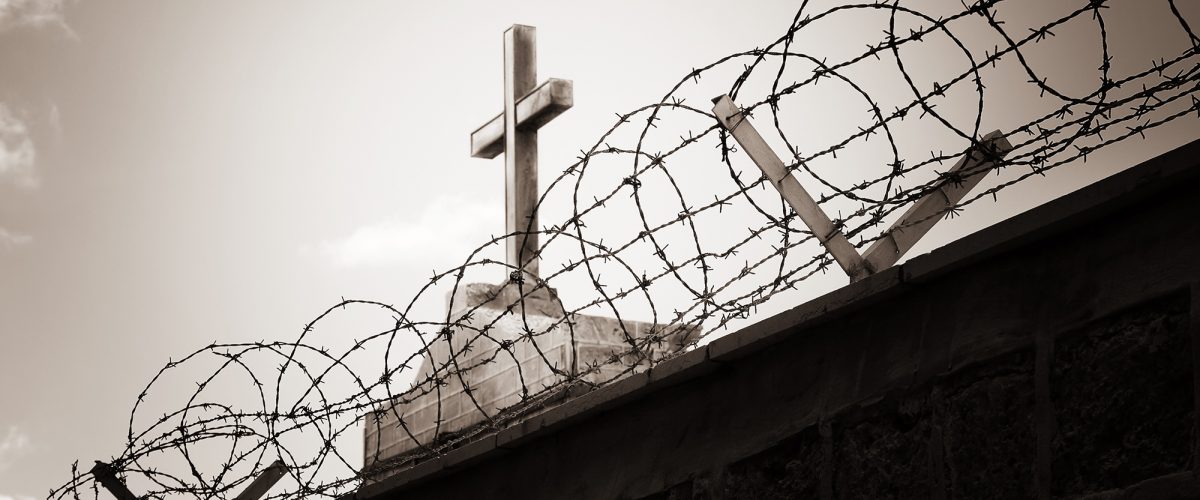A group of Palestinian Christians advocating nonviolent solutions to conflict in the Middle East will hold an online Ecumenical Service of Lament Thursday, Oct. 12, at 11 a.m. U.S. Eastern Time.
“In these grievous times, we aim to offer an opportunity for lamentation and reflection. We will be led by various Palestinian Christian leaders who will impart prayers and thoughts, ‘For where two or three gather in my name, there am I with them,’” said a statement announcing the event.
Leaders will include Catholic Patriarch Michel Sabbah, Greek Orthodox Archbishop Atallah Hanna, Lutheran Bishop Munib Younan, Melkite Greek Catholic Archbishop Elias Chacour, and Anglican priest Naim Atteek, founder of Sabeel Ecumenical Liberation Theology Center.
Sabeel describes itself as “an ecumenical grassroots liberation theology movement among Palestinian Christians. Inspired by the life and teaching of Jesus Christ, this liberation theology seeks to deepen the faith of Palestinian Christians, to promote unity among them and lead them to act for justice and peace.”
Register for the online service here.
Sabeel also released a statement on the current war between the state of Israel and Hamas, which is an open letter others are invited to sign. As of Wednesday, Oct. 11, nearly 600 people had signed it.
“Terrible violence continues between Israeli forces and armed Palestinian resistance groups, resulting in thousands of dead and injured on each side, including scores of civilian men, women and children,” the letter begins. “This devastating escalation comes in the wake of a surprise attack on Israel by Hamas, with Israeli leadership threatening long-term violence and destruction.
“We categorically reject all forms of violence. And we recognize that the only way forward for us is nonviolence.”
“At Sabeel, we envision a future where every life holds intrinsic value, and every individual enjoys freedom and safety, irrespective of their background or identity. Sabeel condemns and mourns the tragic loss of all life and human suffering. We categorically reject all forms of violence. And we recognize that the only way forward for us is nonviolence.”
The letter references the Nakba 75 years ago, the mass displacement and dispossession of Palestinians during the 1948 Arab-Israeli war. It notes “57 years of brutal military occupation in the West Bank and East Jerusalem, and 16 years since the suffocating military blockade of Gaza began.”
Spawned from this history, current events include “the tragic massacre of Israeli civilians,” “indiscriminate bombing campaigns,” “responsive actions that amount to war crimes,” and “genocidal rhetoric,” the letter says.
It cites specific landmarks on the historical timeline:
- “Palestinians have been under attack, suffering dispossession and dehumanization from Zionism, for over 75 years.”
- “The continuation of Israel’s policies related to displacement, apartheid and occupation has been facilitated by the backing of several dominant global powers, notably the U.S., which remains deeply involved in this conflict.”
- “In the past year, an extreme shift to the far-right in the Israeli government has seen an intensified and ruthless military occupation. The Palestinian people face violent expulsions, house demolitions, mass killings, sieges and daily indignities.”
- “There are recurring, oftentimes violent, incidents where Jewish extremists and Israeli forces disrupt the right to freedom of worship, storming the Muslim Al Aqsa mosque in Jerusalem, attempting to lay claim to the site, and intimidating peaceful devotees.”
- “The Israeli authorities have imposed exceptional restrictions on Palestinian Christians and churches, particularly during their religious festivities. Attacks by radical Jewish groups on Palestinian Christian communities and properties persist, with little to no action in response from the Israeli authorities.”
- “Over the years, the people of Gaza have felt the chokehold of a strict Israeli blockade by air, sea, and land, effectively trapping over 2 million individuals and depriving them of fundamental human rights. In recent days, Israel has prohibited all food, fuel, electricity or water from entering Gaza.”
- “Palestinian prisoners, including children, are routinely assaulted, bound, blindfolded, and dragged from their residences in the early hours by Israeli occupation forces, often detained without formal charges or trial in military prisons for months or years. Peaceful protests against these policies, even in the form of hunger strikes, are met with harsh repercussions.”
- “Many Palestinian residences across various villages and towns are either set ablaze by Israeli settlers or demolished by military operations.”
- “Whole Palestinian communities have been forced to vacate their ancestral homes and lands, at times to facilitate Israeli military drills.”
The cycle of violence in Israel and Palestine has been driven by the U.S., UK, Canada and Australia and their “unwavering backing for the Israeli military,” the letter asserts. “The suffering over these years is significantly tied to the role of the international community in this turmoil.”
“The suffering over these years is significantly tied to the role of the international community in this turmoil.”
Signers of the letter pledge their commitment to nonviolent solutions, beginning with an affirmation that while “the might of the Israeli army and its affiliates is unparalleled, violence will not bring victory.”
Nonviolence will enable “collective participation from Palestinians, Israelis and the international community,” the letter continues. “Our ultimate struggle is not against individuals; it is against evil. Violence harms individuals, but our true adversary is the inherent evil of occupation and racist ideologies, which can be vanquished with good, for God is the embodiment of goodness.”
Further, nonviolence “resonates with the divine principles set by the Creator,” the letter states. “As rain is impartial, showering both the oppressed and oppressors, we uphold God’s ways.”
The letter urges all parties to reject violence and not to be “governed by wrath or vengeance.”
“To those still gripping their weapons, we beg you to adhere to the principles of the Geneva Conventions and the laws of armed conflict. Upholding the sanctity of civilian lives is a shared tenet across religions and human morality. Let all combatants refrain from the wanton destruction of human life and adhere, at the very minimum, to the principles of distinction, proportionality, military necessity, fair treatment of prisoners, and no means malum en se (inherently evil methods).”
In summary, the letter concludes that “the elimination of the other is not a viable option.”
Related articles:
‘Two-state solution’ was deemed less likely even before the current war between Israel and Hamas
My heart and my mind are in conflict about Israel and Hamas | Analysis by Rodney Kennedy
Violence begets violence: Hamas’ Pyrrhic victory | Opinion by Raouf J. Halaby
Here are some ways to listen to Palestinian Christians | Analysis by Rick Pidcock
In this war, there are no ‘good guys’ | Analysis by Mark Wingfield


